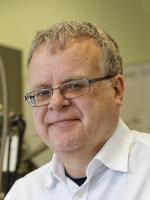
Professor of Physical & Computational Surface Chemistry
My research is centred upon the physics and chemistry of solid surfaces, explored predominantly through first-principles computational techniques (often in conjunction with ultra-high vacuum single-crystal experiments performed by colleagues and collaborators).
Past and present topics of particular interest include:
- surface structure and symmetry, with a focus on chirality at multiple length-scales;
- reaction dynamics of highly-oxidising species on semiconducting surfaces;
- electronic structure of half-metal surfaces, including states with non-trivial topology;
- non-trivial topology in bulk and surface phonon band structures;
- hydrogen and halogen bonding in adsorbed overlayers on graphite and gold;
- heterogeneous catalysis (ammonia synthesis, hydrocarbon combustion and synthesis, water gas shift, selective reduction).
In addition to my primary research, I am the author of two books - Chirality at Solid Surfaces (Wiley, 2018) and Foundations of Surface Science (Oxford University Press, 2023). I lecture undergraduate courses on the Electronic Structure and Properties of Solids; Surfaces and Interfaces; and the Electronic Structure of Solid Surfaces.
Follow me as jnknssj.bsky.social on Bluesky.
Professor Jenkins discusses his research
Publications
- ‹ previous
- Page 19

